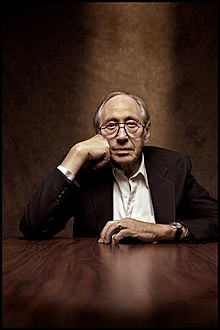Alvin Toffler
American writer, futurist and businessman
Alvin Toffler (October 3, 1928 – June 27, 2016) was an American writer and futurist, known for his works discussing the digital revolution, communications revolution, corporate revolution and technological singularity. A former associate editor of Fortune magazine, his early work focused on technology and its impact (through effects like information overload). His later focus was on the increasing power of 21st century military hardware, weapons and technology proliferation, and capitalism.

| This article on an author is a stub. You can help out with Wikiquote by expanding it! |
Quotes
edit- …the sudden rise of a religious movement in the West that restricts the eating of beef and thereby saves billions of tons of grain and provides a nourishing diet for the world as a whole.
- The Eco-Spasm Report (1975), as quoted in The Higher Taste (1983), p. 13
- Freedom of expression is no longer a political nicety, but a precondition for economic competitiveness.
- 1997 interview with John Perry Barlow, as reported on Twitter
Future Shock (1970)
edit- Change is the process by which the future invades our lives, and it is important to look at it closely, not merely from the grand perspectives of history, but also from the vantage point of the living, breathing individuals who experience it.
The acceleration of change in our time is, itself, an elemental force. This accelerative thrust has personal and psychological, as well as sociological, consequences.- Introduction
- If industrialism, with its faster pace of life, has accelerated the family cycle, super-industrialism now threatens to smash it altogether.
- Change is not merely necessary to life; it is life. By the same token, life is adaptation.
There are, however, limits on adaptability. When we alter our life style, when we make and break relationships with things, places or people, when we move restlessly through the organizational geography of society, when we learn new information and ideas, we adapt; we live. Yet there are finite boundaries; we are not infinitely resilient. Each orientation response, each adaptive reaction exacts a price, wearing down the body's machinery bit by minute bit, until perceptible tissue damage results.
Thus man remains in the end what he started as in the beginning: a biosystem with a limited capacity for change. When this capacity is overwhelmed, the consequence is future shock.- Ch. 15
- By instructing students how to learn, unlearn and relearn, a powerful new dimension can be added to education.
- Ch. 18
External links
edit- Interview with Alvin Toffler by the World Affairs Council
- Alvin Toffler interview on The Gregory Mantell Show on YouTube